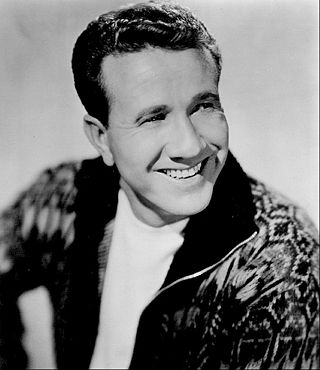
Alan Eugene Jackson is an American country music singer-songwriter. He is known for performing a style widely regarded as "neotraditional country", as well as writing many of his own songs. Jackson has recorded 21 studio albums, including two Christmas albums, and two gospel albums, as well as released three greatest-hits albums.

Martin David Robinson, known professionally as Marty Robbins, was an American singer, songwriter, multi-instrumentalist, and NASCAR racing driver. Robbins was one of the most popular and successful country and western singers for most of his nearly four-decade career, which spanned from the late 1940s to the early 1980s. He was also an early outlaw country pioneer.

Roger Dean Miller Sr. was an American singer-songwriter, widely known for his honky-tonk-influenced novelty songs and his chart-topping country hits "King of the Road", "Dang Me", and "England Swings".

William Orville "Lefty" Frizzell was an American country and honky-tonk singer-songwriter.
Harlan Perry Howard was an American songwriter, principally in country music. In a career spanning six decades, Howard wrote many popular and enduring songs, recorded by a variety of different artists.
Milton Sims "Mickey" Newbury Jr. was an American singer-songwriter and a member of the Nashville Songwriters Hall of Fame.

Rodney Crowell is an American musician, known primarily for his work as a singer and songwriter in country music. Crowell has had five number one singles on Hot Country Songs, all from his 1988 album Diamonds & Dirt. He has also written songs and produced for other artists.

The Jordanaires were an American vocal quartet that formed as a gospel group in 1948. Over the years, they recorded both sacred and secular music for recording companies such as Capitol Records, RCA Victor, Columbia Records, Decca Records, Vocalion Records, Stop Records, and many other smaller independent labels.

Bob Loyce Moore was an American session musician, orchestra leader, and double bassist who was a member of the Nashville A-Team during the 1950s and 1960s. He performed on over 17,000 documented recording sessions, backing popular acts such as Elvis Presley and Roy Orbison. Bob was also the father of multi-instrumentalist R. Stevie Moore, who pioneered lo-fi/DIY music. The New York Times called him "an architect of the Nashville Sound of the 1950s and '60s" in his obituary.

Jack Henderson Clement was an American singer-songwriter and record and film producer. He was producer and engineer for Sam Phillips at Sun Records in its early days, and worked with Carl Perkins, Roy Orbison, Jerry Lee Lewis and Johnny Cash.
This is a list of notable events in country music that took place in the year 1972.
This is a list of notable events in country music that took place in 1969.

Noble Ray Price was an American country music singer, songwriter, and guitarist. His wide-ranging baritone is regarded as among the best male voices of country music, and his innovations, such as propelling the country beat from 2/4 to 4/4, known as the "Ray Price beat", helped make country music more popular.
"Goodbye Marie" is a country-pop song written by Mel McDaniel and Dennis Linde. The song is about a man who has to leave his lover to head for "the lonesome highway" back to his home in Houston, Texas. It was first released by Johnny Rodriguez on his March 1979 album, Rodriguez Was Here.
Robert Glynn Luman was an American country and rockabilly singer-songwriter.
Sanger D. Shafer, better known as Whitey Shafer, was an American country songwriter and musician. He wrote numerous hits for stars such as George Jones, Lefty Frizzell, and George Strait. He was also a recording artist. His highest single "You Are a Liar", under the name Whitey Shafer, reached No. 48 on the Billboard country chart, in 1981.
R. W. Hampton is an American western music singer-songwriter, actor and playwright. Hampton has achieved both critical and commercial success, winning multiple awards from the Western Music Association and the Academy of Western Artists and four separate Wrangler Awards from the National Cowboy & Western Heritage Museum in Oklahoma City.
James Fron "Sonny" Throckmorton is an American country music singer and songwriter. Known primarily for his songwriting, Throckmorton has had more than 1,000 of his songs recorded by various country singers. He has also had minor success as a recording artist, having released two major-label albums: The Last Cheater's Waltz in 1978 on Mercury Records and Southern Train in 1986 on Warner Bros. Records. Throckmorton is a member of the Nashville Songwriters' Hall of Fame, and has been awarded Songwriter of the Year by both Broadcast Music Incorporated and the Nashville Songwriters Association International.
"Ridin' My Thumb to Mexico" is a song written and recorded by American country music artist Johnny Rodriguez. It was released in August 1973 as the first single from the album All I Ever Meant to Do Is Sing. The song was Rodriguez's second number one on the U.S. country singles chart. The single stayed at number one for two weeks and spent a total of thirteen weeks on the charts.
"Pass Me By (If You're Only Passing Through)" is a song written by H.B. Hall that has been recorded multiple times. It was originally recorded and released as a single by American country and Latin singer Johnny Rodriguez. His version of the song became a top ten in North America. In 1980, it was released as a single by American country artist Janie Fricke, whose version reached the top 40 in North America.









